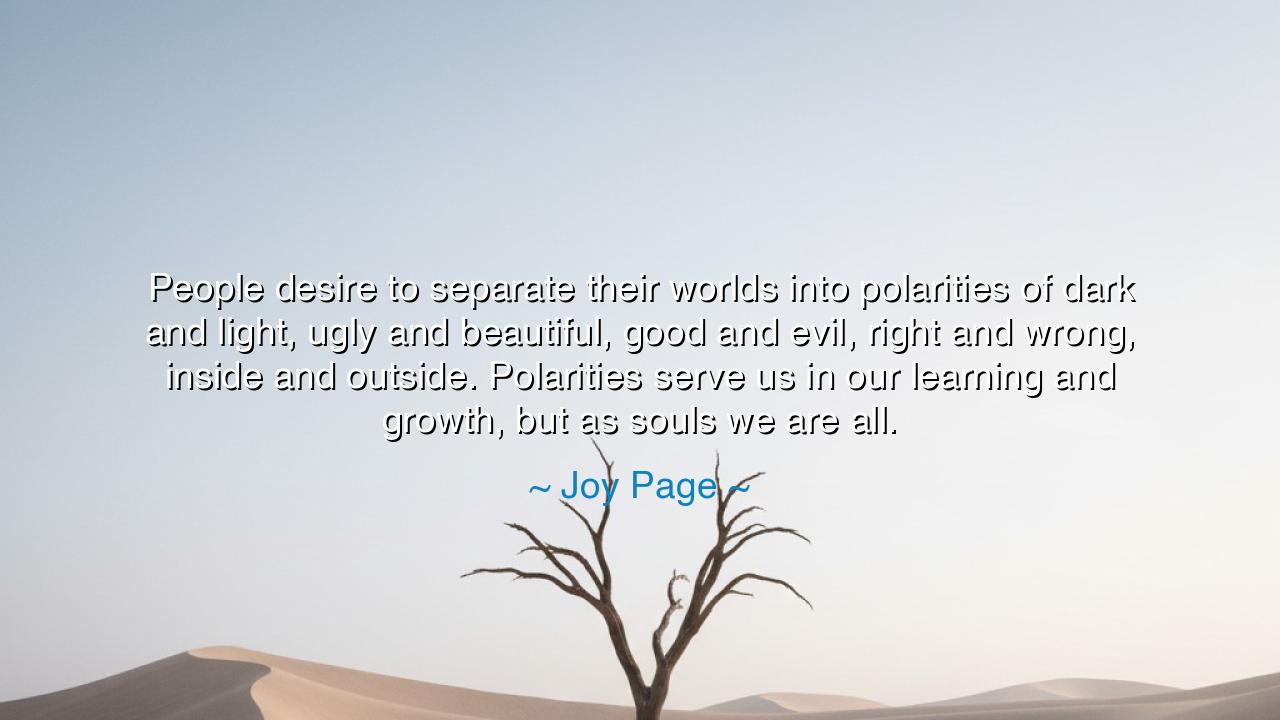
People desire to separate their worlds into polarities of dark
People desire to separate their worlds into polarities of dark and light, ugly and beautiful, good and evil, right and wrong, inside and outside. Polarities serve us in our learning and growth, but as souls we are all.






The words of Joy Page—“People desire to separate their worlds into polarities of dark and light, ugly and beautiful, good and evil, right and wrong, inside and outside. Polarities serve us in our learning and growth, but as souls we are all.”—echo with the wisdom of the mystics and the philosophers of every age. In this reflection, Page unveils the great illusion of division that binds human perception. She reminds us that while duality is the language through which the human mind learns, it is not the truth by which the soul lives. For the spirit does not dwell in opposition—it dwells in wholeness. The quote is a quiet call to transcend the limits of judgment and embrace the unity that lies beyond all contrasts.
The origin of this thought comes from Joy Page’s spiritual philosophy, one shaped by reflection on human consciousness and the inner journey toward balance. Her words arise from a recognition of the paradox at the heart of existence: that we understand light only because we know darkness, and value goodness because we have seen evil. These polarities, though painful, are the teachers of the soul. Yet, Page warns, they are not the ultimate truth. Beyond the dance of opposites lies an eternal stillness—a realm where the soul knows no separation, where beauty and ugliness, right and wrong, joy and sorrow merge into a single, boundless being.
The ancients, too, spoke of this mystery. The Taoists called it the balance of yin and yang, the eternal interplay of opposites through which harmony is born. The Hindu sages taught that the divine Atman contains both creation and destruction, and that enlightenment comes not from choosing one side, but from seeing the whole. Even Jesus, in his sermon of compassion, called upon his followers to love their enemies—not because evil should be embraced, but because the soul must see itself reflected in all. Page’s wisdom walks this same path: that the war between polarities is the forge in which the human being learns, but the peace beyond that war is where the soul awakens.
Consider the story of Nelson Mandela, a man who endured long years of imprisonment under injustice. The world around him was divided into oppressor and oppressed, good and evil, black and white. Yet, when he emerged, he chose not vengeance, but reconciliation. He saw that clinging to one side of the polarity—hatred of the other—would perpetuate suffering. By transcending that division, he moved closer to the wholeness Joy Page describes. Mandela’s strength came from his ability to see unity where others saw separation, to recognize that freedom could not be built upon resentment. In his forgiveness, he embodied the wisdom of the soul beyond polarity.
Page’s insight also exposes why humanity often suffers. We cling to categories—calling one person pure and another corrupt, one culture noble and another savage, one faith righteous and another misguided. Yet every act of division creates distance from truth. The mind, limited and fearful, seeks boundaries to understand the infinite. But the soul, eternal and vast, dissolves those boundaries and whispers, We are all. To live only by polarity is to remain trapped in illusion; to see beyond it is to awaken to oneness, the natural state of the spirit.
Still, she acknowledges that polarities have a purpose. They are the classrooms of existence, the necessary contrasts through which we learn compassion, patience, and understanding. Without the shadow, the light would have no meaning; without error, there would be no growth. The key, then, is not to reject polarity but to rise above it—to use contrast as a tool rather than a cage. The wise do not cling to judgment; they see every experience, whether painful or joyful, as part of the soul’s unfolding journey toward unity.
From this teaching, a clear lesson emerges for all who seek peace: stop dividing the world within and without. Do not label every thought as good or bad, nor every person as enemy or ally. Instead, seek the balance that lies between. When anger arises, see it as the shadow of love; when fear grips you, recognize it as the mirror of courage. To live in wholeness is to see all opposites as parts of one divine motion. The soul’s evolution begins the moment we cease to judge and begin to understand.
Thus, Joy Page’s words become a compass for the modern seeker: embrace the opposites, but do not be imprisoned by them. See darkness as the teacher of light, and sorrow as the soil from which joy grows. Remember that beneath every conflict—between nations, within families, or inside one’s heart—there is a deeper unity waiting to be remembered. For in the end, as she so beautifully declares, we are all: not fragments, not halves, but reflections of one eternal whole. To realize this is to step beyond the illusions of the world and walk, at last, in the light of the undivided soul.






AAdministratorAdministrator
Welcome, honored guests. Please leave a comment, we will respond soon